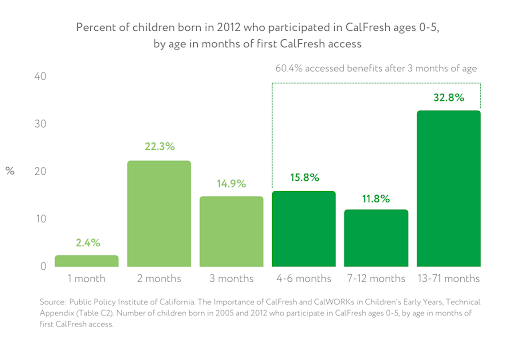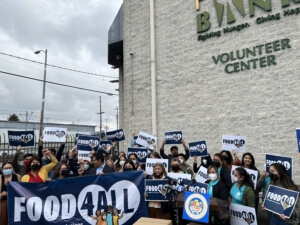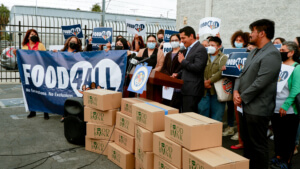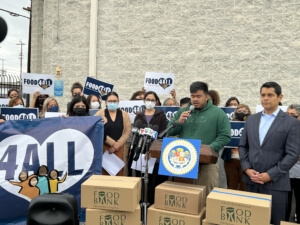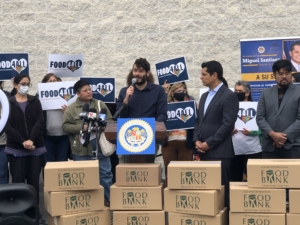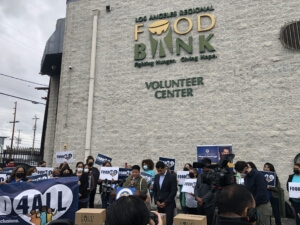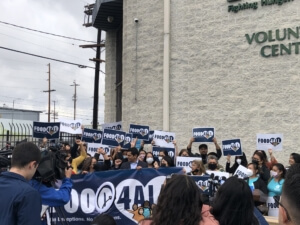Last Friday, Governor Newsom introduced his May Revision to the 2022-23 State Budget proposal. The newly proposed budget uses record anticipated revenue to make largely one-time investments and continue to build reserves. The Governor’s plan includes virtually no new ongoing investments in food and nutrition programs. The proposal falls well short of what is needed to address the longstanding inequities in our state’s nutrition safety net.
Budget Overview
The Governor’s budget projects $49 billion in discretionary revenues, $227 billion in General Fund spending, and builds reserves to $37 billion.
The Governor’s May Revision makes no significant new investments in nutrition programs, but does continue investments in the broader safety net. It fulfills previous commitments to historic ongoing investments in school nutrition and health care for undocumented immigrants. Much more is needed, however, to address the historic rates of hunger experienced by Californians during the pandemic. Low- and moderate-income Californians continue to bear the brunt of the economic impacts of COVID-19, particularly Black and Latinx individuals and families. The state must seize this opportunity to make long-term transformative changes to build a fair, just, and equitable safety net. Nourish California looks forward to working with the Legislature and Administration to ensure a final budget package reflects an equitable approach so that all Californians have the resources to meet their basic needs, including food.
Food and Nutrition
Below is an overview of major funding proposals relevant to food and nutrition.
Food4All: Expanding the California Food Assistance Program (CFAP)
Nourish California is disappointed that the May Revision did not include additional funding to expand eligibility in the California Food Assistance Program (CFAP) to immigrants of ALL ages ineligible for CalFresh solely due to their immigration status. We remain pleased that the Governor’s budget plan will expand CFAP to immigrants age 55 and over beginning in 2022-23, but the May Revision missed an opportunity to build a more equitable nutrition safety net — one that adequately supports ALL Californians when they need help putting food on the table. The Food4All Coalition calls on the Governor and Budget leaders to take a bold step to permanently address the unjust immigrant exclusion in the state’s nutrition safety net. Now is the time for California to dismantle racist and xenophobic exclusions, and invest in bolstering healthy communities and families in our state.
Learn more and take action here: https://act.nourishca.org/campaign/food4all
Child Care Nutrition
Nourish California is disappointed the Administration’s 2022-23 May Revise did not include any additional funding for child care nutrition, specifically the Food with Care proposal. including no provisions to increase funding for child care meals. This despite the fact that child care providers – mainly Black, Brown, and immigrant women – are facing significant food hardship with more than half reporting often or sometimes running out of food.
Nourish California and Food with Care cosponsors the CACFP Roundtable will continue to call on the Governor and Senate and Assembly budget leaders regarding the importance of adequately funding child care and will lift up the need for dedicated child care nutrition funding in the state budget.
Take action: Sign the petition telling Governor Newsom to fund Food with Care in the state budget.
CalFresh
The May Revision includes no new significant investments or improvements in CalFresh, despite California families continuing to face high rates of hunger and inequitable access to food. Nourish California and our anti-hunger partners strongly urge the Governor and Legislature to prioritize expanding the CalFresh Fruit and Vegetable Supplemental Benefits program to provide a much-needed boost to CalFresh benefits.
Take action: Sign the petition telling Governor Newsom to boost CalFresh benefits in the state budget.
K-12 School Nutrition
The Governor proposes an increase to the 2021-22 budget’s historic investment in school nutrition programs. The May Revision increases annual funding for state school meal reimbursements by $611.8 million, reflecting the intent to match the current reimbursement rates happening under federal pandemic waivers. The waivers allow a higher rate of per-meal reimbursement than schools have typically received under the School Breakfast Program and National School Lunch Program. We applaud this tremendous investment in the health, well being, and nourishment of California kids.
We also call on the Governor and the Legislature to ensure sustained funding to reach all students with the nutritious school meals they need. In years past, when the number of school meals served exceeded anticipated participation, schools received a lower per-meal reimbursement from the state than expected. Such unanticipated budget shortfalls create undue burdens on school meal programs. Under the soon to be implemented School Meals for All policies, potential budget shortfalls would be especially disruptive. Nourish California strongly urges the Governor and Legislature to structure the reimbursement as an entitlement, or failing that, to provide for in-year assessments and adjustments that guarantee neither schools nor students will be not short changed.
Learn more and take action here: https://act.nourishca.org/campaign/every-kid
Emergency Food
The Governor’s January 10 budget proposal includes $50 million one-time funding for the CalFood program. While a significant investment in the state’s emergency food system, the Governor’s proposal falls well short of the heightened need food banks are still struggling to meet. Nourish California and the California Hunger Action Coalition are calling on the Governor to allocate $120 million ($60 million ongoing, $60 million one-time) for CalFood so that food banks can purchase California-grown foods.
Nutrition for Older Adults
The Governor’s May Revision does not include any significant new investments in nutrition for older adults.
Broader Safety Net and Income Support Proposals
Below is an overview of additional proposals in the Governor’s budget relevant to the health and well-being of low-income Californians.
Gas Tax Rebate
The Governor proposes allocating $11.5 billion of the record surplus to provide rebates to Californians paying higher prices for gasoline. The program would be administered through the DMV, sending Californians with a registered vehicle a debit card with $400 each for up to two registered vehicles. While the rebate would not be available for vehicles above a certain value, there is no information yet available on the vehicle value eligibility threshold.
The administration’s gas rebate fails to target record surplus dollars to Californians who need it most. According to the California Budget & Policy Center, Californians without cars are twice as likely to struggle to meet their basic needs. If state leaders want to invest in short-term relief, it should target aid to Californians who need help affording rent, food, medication, and transportation, and not at the expense of long-term investments in an equity-centered safety net. Nourish California calls on The Legislature and Governor to enact an economic relief plan that supports Californians who have borne the brunt of the pandemic and economic downturn, in particular Black, Latinx, women, and immigrant Californians.
Economic Support for Californians with Low Income
CalWORKS Grants
The May Revision includes an 11% increase to CalWORKs grants, but falls short of raising CalWORKs grants above deep poverty for all families. The Legislature can and should go further in its budget plan by providing an additional 18% grant increase for households with an excluded member, who are left out of the Governor’s proposed increase.
Refundable Tax Credits
The Governor’s revised budget maintains his January proposals to modestly expand certain refundable tax credits, including the Young Child Tax Credit, and a new tax credit for former foster youth. Disappointingly, it does not include any new proposals to expand the California Earned Income Tax Credit at a time when many Californians with low and moderate incomes need economic support to meet their basic needs and get back on their feet.
SSI/SSP Grants
The 2021-22 state budget included a 24% increase to the state portion of the SSI/SSP grants, and also committed to providing an additional substantial increase to SSP grants in January 2024. While advocates applaud the increase, older adults and people with disabilities need additional economic support as soon as possible. The Governor’s May Revise fails to accelerate these long overdue grant increases, even as SSI/SSP recipients struggle to make ends meet on a fixed income while the cost of basic needs like food and housing spike. The Governor should adopt the Senate budget plan to accelerate the grant increases to provide relief as soon as possible.
Homelessness and Housing
The May Revision maintains the governor’s January homelessness proposals and adds several new proposals to address homelessness,including:
- An additional $150 million in 2022-23 for the Homekey program, bringing total proposed Homekey funding to $2.9 billion over two years.
- An additional $250 million General Fund each year in 2022-23 and 2023-24 for grants to local governments to create interim housing on state-owned land intended as transitional housing pending the development of more long-term housing solutions.
Despite the additional funding to address the homelessness crisis, the Governor’s May Revision represents a missed opportunity to invest in more long-term affordable housing.
Health Care
We are pleased that the Governor’s May Revision maintains the January proposal to expand Medi-Cal eligibility to undocumented immigrants ages 26 to 49, meaning beginning in 2024, all undocumented immigrants in California will be eligible for comprehensive Medi-Cal coverage. Nourish California applauds the Governor for this step toward a more equitable health care system, and call on him to do the same for vital food assistance by fully funding Food4All.
What’s Next?
The Legislature is currently holding hearings to discuss the Governor’s May Revision. Negotiations between the Administration and Legislature will now begin in earnest. The Legislature has until June 15 to pass the budget bill and the Governor’s must sign the final budget no more than 12 days following the bill’s passage.
Critical nutrition priorities will continue to need broad and vocal support to be included in the final budget package. You can stay up to date on our budget advocacy and receive timely calls to action by visiting our Action Center. Make your voice heard to help ensure that all Californians have the food they need to thrive.
Questions?
Contact Jared Call at jared@nourishca.org or 323.401.4972
